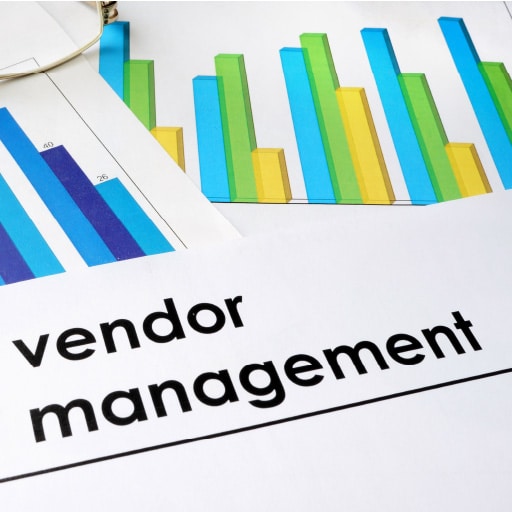
When exploring a relationship with a new vendor, there are risks involved. It could be that a vendor isn’t well established or financially sound. There could also be questions with the quality of the finished product or doubts that the goods will arrive on time – especially considering the current climate of supply chain disturbances.
The problem is, companies often need to deal with new vendors to get a new product or service to market, regardless of their history. In these cases, there are several ways that businesses can mitigate risks and protect their investment.
Strong vendor relationships are essential to managing risk.
According to a study by McKinsey, strong, collaborative relationships with suppliers can lead to “higher growth, lower operating costs, and greater profitability.” However, many businesses struggle to build these relationships. To that point, only 13% of companies have a fully established supplier relationship management program.
Prior to the pandemic, only 70% of businesses indicated that their key suppliers delivered products and services on time and according to the agreed upon specifications. Today, these issues are more prevalent than ever with the myriad of upstream supply chain problems hitting businesses.
Between May 31st and June 6th of 2020, 36% of businesses reported supply shortages. While lumber prices and semiconductor shortages have been the most heavily reported, businesses in almost all sectors have experienced delays or unavailable inputs throughout the pandemic.
Implement a Supplier Relationship Management Program to Reduce Risk
The first step in creating a supplier relationship management program is identifying which suppliers are key to business success. Categorizing vendors based on their value to a business’ end product can help business leaders determine which relationships should receive the most attention.
Once key suppliers are identified, businesses must evaluate how potential problems with these suppliers might impact operations. A risk management plan should quantify supply chain risks including the dependability and resiliency of supplier partnerships.
Choosing the Wrong Supplier Risks Lost Money or Reputation
Whether a business is changing suppliers due to past performance or working with an untested vendor to create a new product line, starting a relationship with a new vendor can create additional risk. Faulty products delivered by suppliers can cost companies money and their reputation. For example, Honda had to pay over $96 million when supplier Takata made and delivered faulty airbags.
It is important to interview a new supplier to determine the quality of their products, their customer service, and their financial resilience before agreeing to work them. However, even if a business does their due diligence when choosing a new vendor, final delivery of products can disappoint. When this happens, businesses can be left holding the bag.
When issues occur, businesses must negotiate with suppliers to receive a refund or other compensation. If negotiations fail, litigation is the only remaining option. Lawsuits can take additional time and money to complete. According to the SBA, an average civil case involving a small business can cost $50,000 to $100,000 and take nearly two years to go to trial. Costs can be much higher for larger businesses and timeframes can extend with appeals. This is why its critical to leverage business escrow services when onboarding new vendors.
Managing New Vendor Risk with Business Escrow
When working with a new vendor, the first step in mitigating risk is to perform due diligence before establishing a relationship. Secondly, businesses should ensure that purchase agreements are specific and in writing. Lastly, using a business escrow service can provide an additional level of security during a large transaction.
An escrow service ensures that the terms of a contract are met before payment or other deliverables are released. For businesses in a large transaction, this means that suppliers must provide the agreed upon quantity and quality of goods, in the agreed upon timeframe, before they receive payment. This service also benefits vendors who can rest assured that their payment is set aside for them to receive after delivery and inspection of the products. Using an escrow service can add an additional layer of security to large transactions and can also help foster strong working relationships with vendors.
Business Escrow at the American Deposit Management Co. [ADM]
This may come as a surprise, but all escrow agents are not created equal. The costs and types of protection can vary from agent to agent, and that can impact a company’s bottom line.
FDIC and NCUA insurance provide the most robust protection available for business cash. That’s because funds covered by the FDIC or NCUA are backed by the full faith and credit of the U.S. Government, but coverage is normally limited to $250k per account type at each bank.
At ADM, we have developed a network of community banks and credit unions that allows us to distribute virtually any amount of business cash so that every penny can be protected by FDIC or NCUA insurance. This means that all funds in an ADM escrow account can receive the highest level of protection.
Earn More, Risk Less® with Escrow Services by ADM
Contracts can take months to negotiate, and suppliers may need additional time to manufacture products or deliver raw materials. During this time, businesses that work with ADM can earn a competitive return on their escrow funds. This is possible because banks in our network compete for deposits. This competition ensures that businesses get nationally competitive returns for their escrowed cash.
To learn more about our services, contact a member of our team.
For more updates on how to manage business cash and to stay abreast of interest rate changes, banking industry insights, and other valuable financial information, be sure to check out our Insights page and follow us on social media.
*American Deposit Management Co. is not an FDIC/NCUA-insured institution. FDIC/NCUA deposit coverage only protects against the failure of an FDIC/NCUA-insured depository institution.